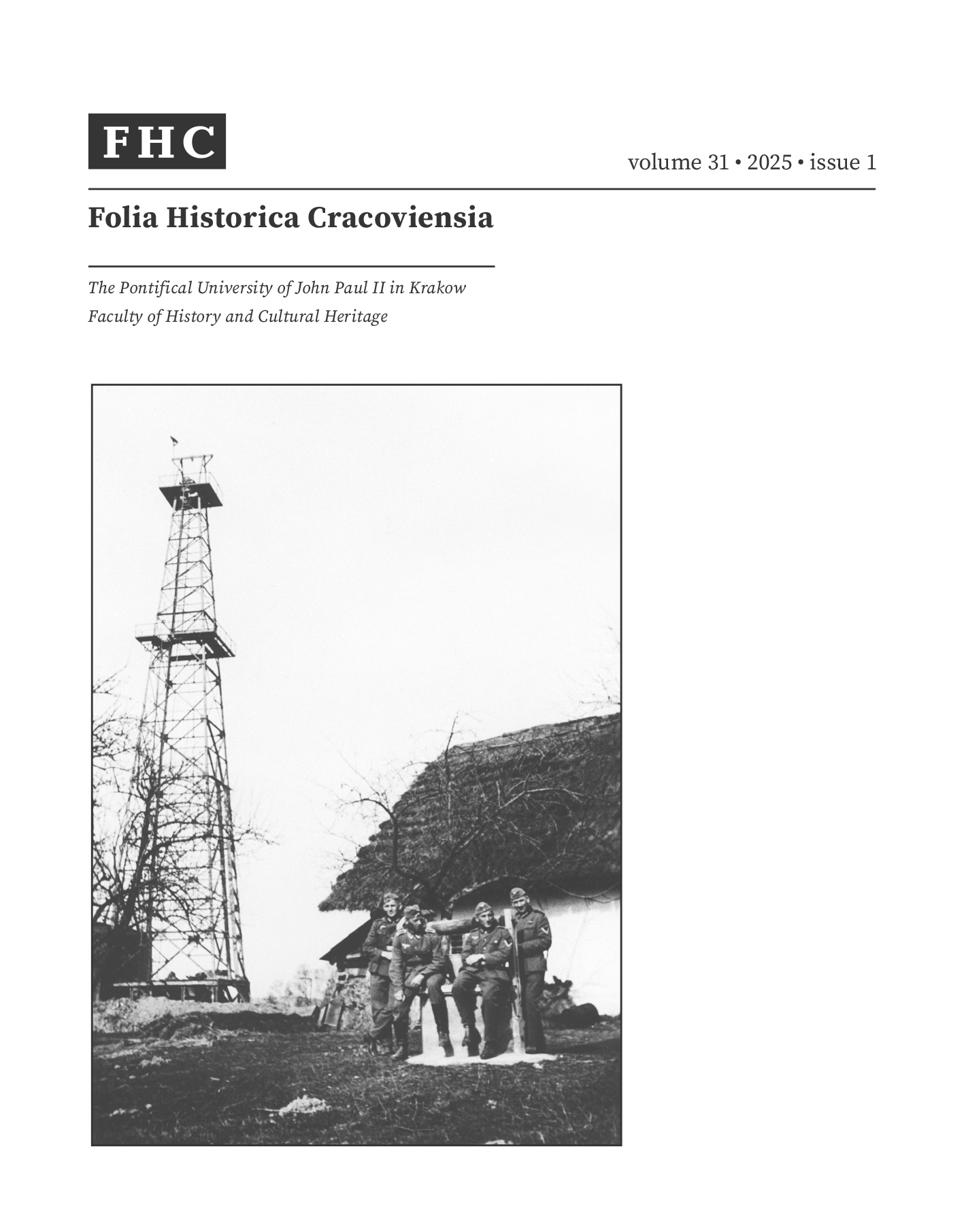Absent and underestimated? The problem of the German occupation of Poland in the general English-language narrative of World War II
DOI:
https://doi.org/10.15633/fhc.31101Keywords:
Second World War, German occupation, Poland, Nazism, Third ReichAbstract
This article seeks to address the question of how the German occupation of Poland is represented in the broader scholarly narrative of the Second World War. The analysis is based on selected syntheses of World War II history, works on the history of the Third Reich, as well as selected biographies of Adolf Hitler and Heinrich Himmler published in recent decades. Based on these sources, the author concludes that the German occupation of Poland is not forgotten in the general narrative of World War II and that the suffering of the Polish people is acknowledged. At the same time, there remains a need to incorporate the Polish wartime experience more fully into the overarching narrative. To this end, it appears necessary to develop a new thematic synthesis of the occupation of Polish territories—one that highlights the significance of the German occupation of Poland for the overall character of the Second World War.
References
Bartnicka A., Światopogląd w działaniu. Heinrich Himmler i jego wizja rasowego imperium III Rzeszy, Gdańsk 2023.
Beevor A., Druga wojna światowa, przeł. G. Siwek, Kraków 2013.
Borejsza J. W., Antyslawizm Adolfa Hitlera, Warszawa 1988.
Borejsza J. W., Śmieszne sto milionów Słowian. Wokół światopoglądu Adolfa Hitlera, Gdańsk 2016.
Brewing D., W cieniu Auschwitz. Niemieckie masakry polskiej ludności cywilnej 1939–1945, tłum. R. Dziergwa, Poznań 2019.
Bullock A., Hitler. Studium tyranii, tłum. T. Evert, Warszawa 1969.
Burleigh M., Trzecia Rzesza. Nowa historia, tłum. G. Siwek, Kraków 2010.
Bydgoszcz 3–4 września 1939. Studia i dokumenty, red. T. Chinciński, P. Machcewicz, Warszawa 2008.
Davies N., Europa walczy 1939–1945. Nie takie proste zwycięstwo, przekł. E. Tabakowska, Kraków 2008.
Davies N., Przedmowa, w: R. Lukas, Zapomniany Holocaust. Polacy pod okupacją niemiecką 1939–1944, tłum. S. Stodulski, Poznań 2012.
Evans R. J., Who remembers the Poles?, „London Review of Books” 23 (2010) no. 21, https://www.lrb.co.uk/the-paper/v32/n21/
richard-j.-evans/who-remembers-the-poles.
Evans R. J., Wojna Trzeciej Rzeszy, Oświęcim 2017.
Gilbert M., Druga wojna światowa, przeł. J. Kozłowski, Poznań 2000.
Goebbels J., Dzienniki, t. 2: 1939–1943, wstęp, oprac. i tłum. E. C. Król, Warszawa 2013.
Grochowina S., Kącka K., Polityka niemieckich władz okupacyjnych na Pomorzu Gdańskim. Dokumentacja wybranych problemów, Toruń 2018.
Hastings M., I rozpętało się piekło. Świat na wojnie 1939–1945, przeł. M. Ronikier, Kraków 2013.
Kałabunowska A., Koncepcja wielkiego człowieka. Wybrane zagadnienia, „Poliarchia” 3 (2015) nr 2 (5), s. 133–149, https://doi.org/10.12797/Poliarchia.03.2015.05.06.
Kay A. J., Imperium zniszczenia. Historia nazistowskiej masowej Zagłady, przeł. A. Bukowski, J. Środa, Poznań 2023.
Kershaw I., Hitler 1936–1941: Nemezis, przeł. P. Bandel, Poznań 2014.
Lemkin R., Axis rule in occupied Europe. Laws of occupation, analysis of government, proposals for redress, Washington 1944 (pol. tłum. Rządy państw Osi w okupowanej Europie. Prawa okupacyjne, analiza rządzenia, propozycje zadośćuczynienia, tłum. A. Bieńczyk-Missala i in., Warszawa 2023).
Longerich P., Himmler. Buchalter śmierci, przeł. S. Szymański, J. Skowroński, Warszawa 2014.
Longerich P., Hitler. Biografia, tłum. M. Antkowiak, Warszawa 2017.
Lubecka J., Wokół Polen-Denkmal. Rozbieżności w polskiej i niemieckiej pamięci o ofiarach drugiej wojny światowej, „Rocznik Polsko-Niemiecki” 31 (2023), s. 81–105, https://doi.org/10.35757/RPN.2023.31.04.
Madajczyk P., Okupacja niemiecka w Polsce w świetle historycznej teorii genocydu, w: Pomorze pod okupacją niemiecką. Jesień 1939, red. P. Madajczyk, Warszawa 2021, s. 109–131.
Mazower M., Imperium Hitlera, przeł. A. Maziarska, J. Maziarski, Warszawa 2011.
McMeekin S., Wojna Stalina, przekł. A. Bugaj, Kraków 2024.
Moorehouse R., Pakt diabłów. Sojusz Hitlera i Stalina, przeł. G. Siwek, Kraków 2015.
Moorhouse R., Polska 1939. Pierwsi przeciw Hitlerowi, przekł. B. Pietrzyk, Kraków 2019.
Overy R., Trzecia Rzesza. Historia imperium, przeł. M. Antosiewicz, H. Turczyn-Zalewska, Warszawa 2012.
Padfield P., Himmler. Reichsführer SS, przeł. S. Baranowski, Warszawa 2002.
Porter-Szűcs P., Całkiem zwyczajny kraj. Historia Polski bez martyrologii, tłum. A. Dzierzgowska, J. Dzierzgowski, Warszawa 2021.
Rees L., Holocaust. Nowa Historia, Warszawa przeł. Ł. Praski, Warszawa 2018.
Simms B., Hitler, przeł. M. Szymański, J. Środa, A. Bukowski, Poznań 2022.
Snyder T., Skrwawione ziemie. Europa między Hitlerem a Stalinem, przeł. B. Pietrzyk, Warszawa 2011.
Ullrich V., Hitler. Upadek zła 1939–1945, przeł. M. Antkowiak, Warszawa 2021.
Voegelin E., Die politische Religionen, Monachium 1996.
Voegelin E., Lud boży, tłum. M. Umińska, Kraków 1994.
W cieniu Einsatzgruppen. Volksdeutscher Selbstschutz w okupowanej Polsce 1939‒1940, red. I. Mazanowska, T. Ceran, M. Przegiętka, Warszawa 2021.
Downloads
Published
Issue
Section
License
Copyright (c) 2025 Tomasz Ceran

This work is licensed under a Creative Commons Attribution 4.0 International License.
Authors who publish with this journal agree to the following terms:
- Authors retain the copyright and full publishing rights without restrictions, and grant the journal right of first publication with the work simultaneously licensed under a Creative Commons Attribution 4.0 International License that allows others to share the work with an acknowledgement of the work's authorship and initial publication in this journal.
- Authors are able to enter into separate, additional contractual arrangements for the non-exclusive distribution of the journal's published version of the work (e.g., post it to an institutional repository or publish it in a book), with an acknowledgement of its initial publication in this journal.
- Authors are permitted and encouraged to post their work online (e.g., in institutional repositories or on their website) prior to and during the submission process, as it can lead to productive exchanges, as well as earlier and greater citation of published work (See The Effect of Open Access).

